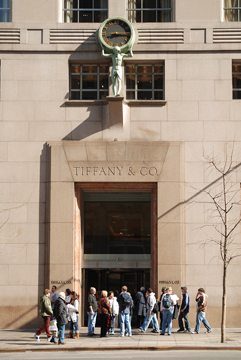|
RAPAPORT... Attorneys for Tiffany & Co. filed a motion with the U.S. District Court in the Southern District of New York to dismiss Costco Wholesale Corporation's counterclaim, concluding that the ''Tiffany setting'' is generic and unenforceable as a trademark. Costco is not seeking authority to use a mark similar to ''Tiffany,'' but rather is asking the court to declare everyone is free to use the identical mark for certain jewelry products as if there was no registration at all, according to the plaintiff's attorneys. Tiffany & Co. argued that entertaining Costco's counterclaim sanctions the counterfeiting of certain items, even though the incontestable mark would remain for other products, including within the class subcategory of “jewelry.”  Tiffany & Co. sued Costco in February alleging the defendant knowingly and willfully violated its trademark by promoting and selling rings as ''Tiffany,'' when in fact the rings were not made by Tiffany & Co., according to both parties. Costco sought to have the case dismissed on the grounds that the ''Tiffany setting'' should be generic. In response this past week, the plaintiff stated that the court does not even have the authority to grant Costco's counterclaim and invalidate an incontestable, fanciful trademark for only one particular use in a trademark class such as jewelry. Secondly, Tiffany & Co. argued that a discovery period is not required in this case before a summary judgment may be granted based upon prior case law. While pre-discovery summary judgment is an exceptional remedy, it is appropriate where a party cannot prevail on a claim, according to the plaintiff. ''In this day and age, with the inordinate cost associated with the retrieval and production of electronically stored information alone, not to mention other forms of discovery, a party should not be subjected to those costs on a claim that has no merit,'' according to Tiffany's attorneys. ''Costco cannot invalidate the fanciful Tiffany trademark for one jewelry use only. Accordingly, discovery about that claim would be a complete waste of resources.'' The defendant has not alleged, ''nor can it in good faith allege, that the Tiffany trademark itself is a generic term that has lost all its trademark significance as a source identifier to the consuming public.'' Accordingly, Tiffany is entitled to judgment dismissing Costco’s counterclaim, the plaintiff concluded. Tiffany & Co. does not claim an exclusive right to the prong design it originated, a point which Costco intentionally confuses, according to the plaintiff. ''What Tiffany does have, however, is the exclusive right to use its incontestable and famous trademark 'Tiffany' for any jewelry product or design, including its own 'setting' made to Tiffany’s proprietary and exacting standards.
''The mark 'Tiffany' identifies the source of Tiffany’s own products and designs, a fundamental purpose for trademark protection. Tiffany has the exclusive right to use its mark as an adjective alongside any noun that designates a jewelry product or design, whether that word is setting, diamond, jewelry, bracelet or anything else. Such a use cannot turn the word 'Tiffany' generic, no matter how successful the modified noun becomes as a product or design,'' the plaintiff's attorneys wrote. Using the examples of ''thermos'' and ''cellophane,'' the plaintiff argued that the trademark itself became generic over time because it was eventually the only way to describe the product class. One of the fallacies of the defendant's counterclaim, however, is illustrated by the term Coke®, which is an incontestable trademark held by the Coca Cola Company, and it is also a word used colloquially to describe a famous flavor of soft drink, Tiffany's attorneys wrote. ''Costco, which also manufactures products under its Kirkland Signature house brand, cannot call its own soft drink 'Coke flavor' even if its taste mimics that of real Coke. Trademarks distinguish products of one manufacturer from another. The more famous the product, the more valuable trademark protection becomes. Tiffany did not seek a trademark on the phrase 'Tiffany setting.' Instead, it properly used its incontestable trademark Tiffany as an adjective to modify the noun setting, no different than in other circumstances Tiffany owns and controls 97 separate trademarks,'' according to the filing. While Costco's counterclaim alleged that Tiffany is generic, when used in one particular context, it is undisputed that Tiffany, standing alone, is not generic, having been derived from the last name of Tiffany’s founder, Charles Lewis Tiffany, the plaintiff stated. It is used by Tiffany as a brand, and refers to a wide variety of products. Tiffany's original lawsuit against Costco does not accuse the defendant of using the phrase “Tiffany setting;” it alleged that the defendant used the mark “Tiffany” alone to describe two multi-thousand dollar engagement rings, the styles of which replicated a ring with a real “Tiffany® setting.” Nonetheless, the counterclaim tries to ''blur defendant’s blatant counterfeiting of Tiffany’s mark by claiming 'Tiffany' was not meant to convey that the subject rings were made by Tiffany, but rather to describe the style of ring as one with a Tiffany setting. It therefore seeks a declaration that anyone can call an engagement ring Tiffany if it has prongs,'' attorneys for the plaintiff wrote. Costco intentionally confused the circumstance of marks themselves that describe a product – such as Band Aid® or Kleenex® – from those that are used as an adjective to denote the source of a product or service, the plaintiff argued.
''And, even with respect to those incredibly famous marks, they are not treated as generic, in part because the holder joined those trademarks with the word 'brand' (Band Aid® 'brand' adhesive bandages, Kleenex® 'brand' tissues, etc.). Tiffany is fanciful, and not even arguably descriptive as a standalone trademark. Therefore, its use with the word 'setting' cannot throw the mark into the public domain.''
|